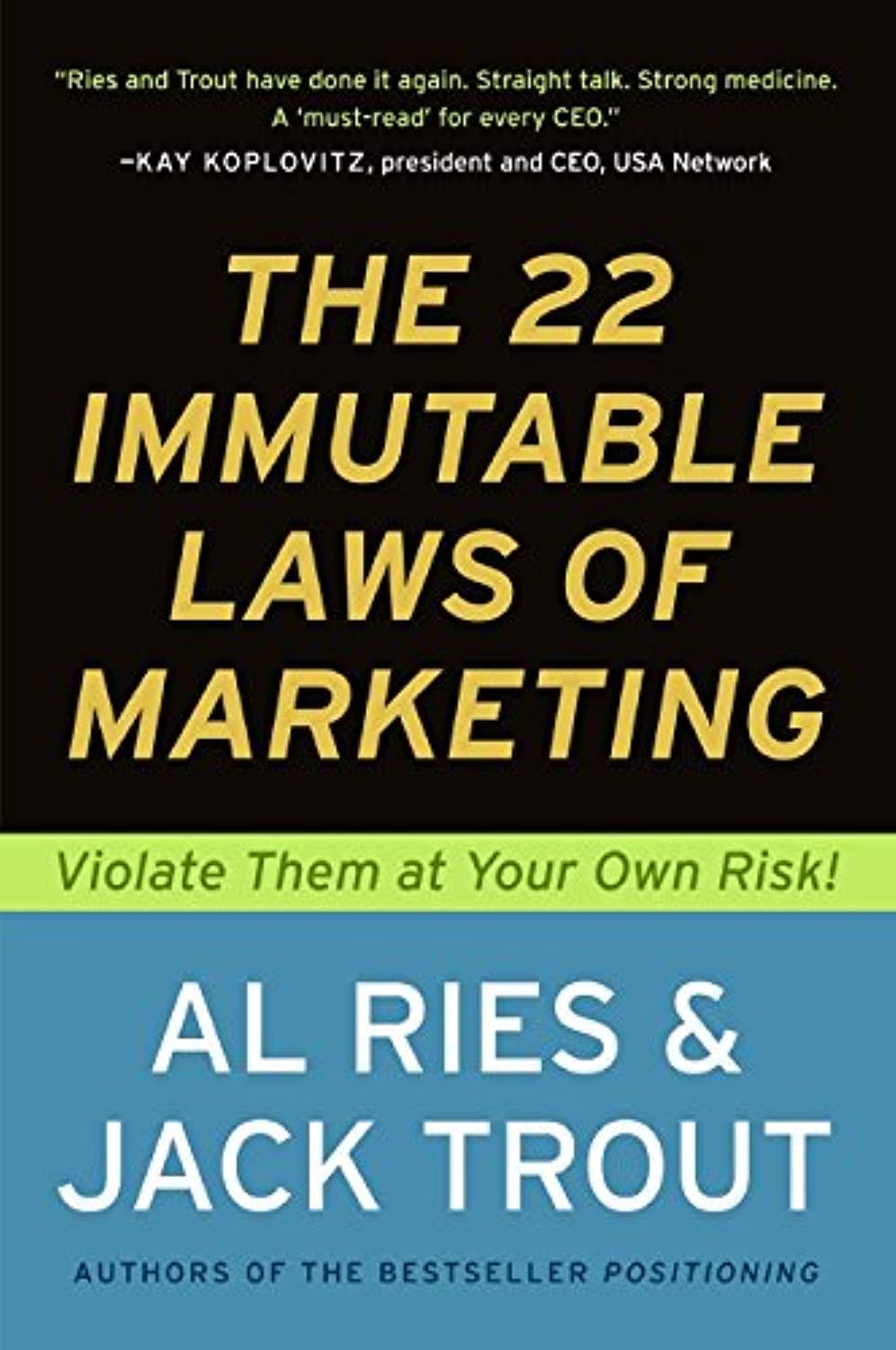This Week’s Book: 22 Timeless Principles of Marketing
Last week, I read Invested, the autobiography of Charles Schwab, founder of the namesake firm. One of my big takeaways was how well Schwab understood marketing and leveraged it heavily to acquire customers. Marketing and technology were huge differentiators for the company and led to success.
Several months ago, I bought the book The 22 Immutable Laws of Marketing by Al Ries and Jack Trout. I decided to read it after learning how critical the market was to Schwab. The book discusses 22 laws that distill marketing to its bare essence in a way non-marketers like me can understand.
Here are the 22 laws:
- Laws of Leadership – It’s better to be first in a category than to have the best product in a category. “Marketing is a battle of perception, not products.”
- Law of the Category – If you can’t be the first person in a category, find a new category you can be first in. Amelia Earhart was the third person to fly over the Atlantic Ocean solo, but she’s remembered as the first woman to accomplish this.
- Law of Mind – It’s better to be first in the prospect’s mind than the first to market with your product. Being first to market with a product is important only because it allows you to be first in the mind of the prospect. “If marketing is a battle of perception, not product, then the mind takes precedence over the marketplace.”
- Law of Perception – Marketing isn’t a battle of products or product quality; it’s a battle of perception. What matters most is the perception of your product in the minds of people. Studying how perceptions are formed in the mind is key.
- Law of Focus – The most powerful concept in marketing is owning a word in the prospect’s mind. You can “burn” your way into a prospect’s mind by narrowing your focus to a single word or concept.
- Law of Exclusivity – Two companies can’t own the same word in a prospect’s mind.
- Law of the Ladder – The marketing strategy you use depends on where you rank on the ladder. If you’re not number one, that’s OK, but your marketing strategy can’t be to market as if you’re number 1. You must own your number 2 position and market accordingly.
- Law of Duality – In the long run, most markets are dominated by two companies.
- Law of Opposite – If you want to own the second rung on the ladder, study the number 1 company. Find its strength and present the customer with the opposite. Don’t try to beat it at its game; try a different angle, try to be different.
- Law of Division – Large categories will, over time, split into subcategories.
- Law of Perspective – The true effects of marketing take place over a long period of time. The short-term effect is often the opposite of the long-term effect. Discounting boosts revenue in the short term but decreases margins and long-term revenue by conditioning customers to buy only when there’s a sale.
- Law of Line Extension – Line extension is taking the brand name of a successful product and applying it to a new product. This seems logical and is irresistible because it’s the easy way to jump-start a new product, but it often doesn’t work.
- Law of Sacrifice – You have to give up something (i.e., you have to focus) to be successful. Being focused allows you to become known for something in the prospect’s mind.
- Law of Attributes – You must have an idea or product attribute that you own and can focus your efforts on. Don’t emulate and try to own attributes that others own, especially the market leader.
- Law of Candor – Admitting a negative about yourself is disarming to your prospect, and they automatically accept it as truth. It opens people’s minds and makes them more receptive to whatever you have to say.
- Law of Singularity – One marketing effort will likely produce the vast majority of your results. This law is similar to the Pareto Principle (i.e., the 80/20 rule).
- Law of Unpredictability – Marketing plans based on predictions about the future will usually fail. You can’t predict the future, so don’t try to predict how your competitors will react or what the future state of your market will be.
- Law of Success – Successful people often become less objective. Success breeds arrogance, and arrogance can breed failure. Always focus on what the market wants, not what you think.
- Law of Failure – Failure is inevitable and part of the journey. Expect it and accept it. Recognize when you’ve made a mistake or failed, and cut your losses early.
- Law of Hype – “The situation is often the opposite of the way it appears in the press.” Things that are going well don’t need hype. “Revolutions don’t arrive at high noon with marching bands and coverage on the 6:00 P.M. news. Real revolutions arrive unannounced in the middle of the night and kind of sneak up on you.” “Forget the front page. If you’re looking for clues to the future, look in the back of the paper for those innocuous little stories.”
- Law of Acceleration – Long-term success isn’t built on fads; it’s built on trends. If you think you’re in a fad, one way to keep long-term demand high is to never fully satisfy the demand.
- Law of Resources – Marketing is a battle fought in the prospect’s mind. You need money to get into their mind and stay there. Marketers with money get more money because they have the resources to “drive their ideas into the mind.”
After reading this book, I thought about several marketing mistakes I’ve made. If I’d understood these laws, I would’ve made different decisions. If you’re like I was and could use a marketing-principles-for-dummies book, consider reading The 22 Immutable Laws of Marketing.




